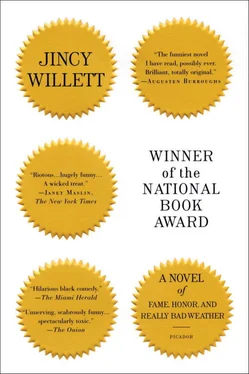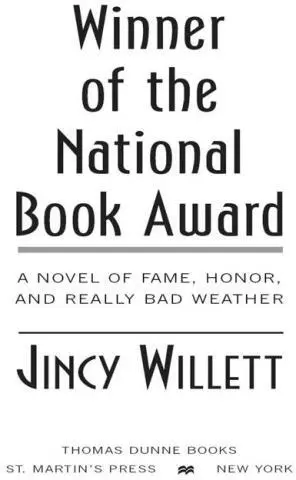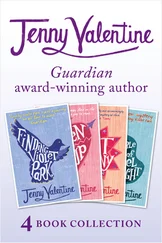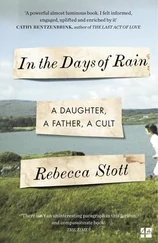Jincy Willett
WINNER OF THE NATIONAL BOOK AWARD
A Novel of Fame, Honor, and Really Bad Weather
For Ward and Joanne Willett
Fame and honor are twins; and twins, too, like Castor and Pollux, of whom one was mortal and the other was not. Fame is the undying brother of ephemeral honor.
—Schopenhauer
August 15, 1983
Lightning sought our mother out, when she was a young girl in Brown County, Indiana. Licked her body up and down, so she said, with a long scratchy cat tongue. She smelled the ozone, which she described as indescribable. “Not a smell at all, really, but a new and horrible sensation of the nose.” We used to beg her to elaborate. She said it didn’t smell like animal, vegetable, or mineral, or anything else in the world. Then how did you know? we asked. “It had,” she tried again, “a tactile pungency. Every hair on my body stood out straight and vibrated. I wanted to drop flat on the ground but I couldn’t move. It licked me like a big cat! Girls, I was an idea in the mind of a charged cloud!”
Then the lightning dismissed her, and demolished a dying elm across the street. “You always look so disappointed,” she’d tell us, when she came to the end of the story. “You wouldn’t be here, you know, if it hadn’t let me go.” But both of us truly were a little sorry she wasn’t struck. It reflected badly on our mother, that she was tasted and found wanting. Fate had jilted her. “Where would we be?” Abigail always asked, and Mother would answer, variously, In heaven, In deep space, Nowhere, Who knows?, A twinkle in your father’s eye. When I was twelve, one of the last times we talked about it, I said, “Maybe we’d be an idea in the mind of a charged cloud.” Mother was terribly pleased.
As it turns out, I have never been an idea in the mind of a charged cloud. I have never, with the one grotesque exception, been an idea in the mind of anybody at all. I’m earth-bound, of course, but not grounded. My sister is the family lightning rod.
Mark Twain was right: New England weather is a literary specialty, not a science. He gave a more reliable forecast in 1876 than those boobs on channel ten.
Probable nor’-east to sou’-west winds, varying to the southard and westard and eastard and points between; high and low barometer, sweeping round from place to place; probable areas of rain, snow, hail, and drought, succeeded or preceded by earthquakes and thunder and lightning.
I woke up this morning with a hurricane headache and turned on the stupid TV and there they were, one of each sex, babbling in front of a huge weather map. “We’re going to get it,” the man said, and the woman added that “the only question is how hard it’s going to hit. Pandora is on the way.” Last night these same people were promising she’d miss us by a hundred miles.
A hurricane headache is no guarantee. The big one is out there somewhere, that’s all, eyeing your neighborhood. You’re on her list, and the atmospheric pressure plummets, skyrockets, some damn thing, and the air is humid, smelly, ominous, and your head feels caught in a padded vise. You want to crawl right out of your skin.
We had a bad one here, in Rhode Island, in 1938, the year of our birth, and another bad one in ’54, which I remember, and that’s it. Rhode Island is not Key West.
Many have noticed this.
Hurricane headaches make you feel antsy and doomed, but they can be gotten around, like the premenstrual whim-whams. You just remind yourself that your emotions are physical in origin, and ignore them. I’m good at that.
“How bad it’s going to be is anybody’s guess.” The man in the red blazer, Ernie, was unable to act convincingly as though this were bad news. “We’re going to get it for sure.”
“The main thing right now,” his partner added, “is not to panic.”
“And remain calm. I repeat. Hurricane Pandora is on the way. I repeat. Pandora is coming.”
“And not just her tail.”
“Nope. Head to toe!”
“Full body slam!”
“She’s got us in her sights!”
“We’re staring right up her gun barrel!”
“She’s made a shambles out of Cape Hatteras!”
“Heading straight for us at thirty-seven per!”
“But don’t panic!”
From my bay window in the living room I could see at least two people dutifully panicking already. Old Mrs. McArch had just about covered all her windows with masking tape, and John and Marie Bucci were squeezing children and beagles into the station wagon.
The Buccis always head out. They headed out in ’68, when we were supposed to get the race riots. I asked John then where he was going, and John stopped and thought and said, “Burlington?” I pointed out (I was only thirty; I had more energy then) that (a) we weren’t going to get any riots, and (b) if we did they’d be in Providence, where Negroes actually live, and not way out here in Frome. John shrugged. “Yeah, I know,” he said, reddening, staring down at two bulging suitcases, “but hey.” John’s a nice guy. I always wish him luck. John is my bellwether, and John was heading out.
Today was supposed to be my day off. I had scheduled my Saturday crew, T. R. and Gloria, to man the library without me, and particularly to catalogue that three-foot pile of new books standing on the floor beside my desk. Usually I do these myself, the new books. Usually I want to. Of all my duties, opening brand-new books is the most pleasurable. When it comes to books, I am a sensuous woman. Usually. But not today, and so, naturally, today is Panic Day, and the Saturday people have flown away home, and I have had to come in myself and face it. The new book pile.
I knocked on Anna’s door and told her about the forecast, and asked, did she want to come with me. She was already awake, listening to her clock radio, and said she’d stay here by herself. “I’ve always wanted,” she said, “to batten down the hatches.” How a twenty-year-old could have “always wanted” to do anything was a puzzler, but her decision was just as well. Today I didn’t need the company. I poured some scotch in our father’s old silver flask, put on jeans and a white shirt, filled three grocery bags with towels, and drove out to the Star for cold cuts and bread.
I’m not a drunk, by the way. It’s going to be a long day, that’s all.
I waved to John and Marie as I backed out the driveway. John shouted that they were heading up to Portland. “But the storm is moving north,” I said. “I know,” Marie said, and John said, “We know. But hey.” We all had a nice laugh, and I wished them luck.
It was six thirty A.M. and twenty people stood outside the locked glass doors of the Star, watching the manager and a couple of checkers shuffle around inside. When I joined them they greeted me like a family member. I had forgotten about this. Rhode Island gets so few near misses, so little natural drama, that I forget from one time to the next about this phenomenon: what Conrad Lowe called “the disaster factor.”
Rhode Island natives, including those born overseas, are under ordinary circumstances so shy and mistrustful around people they don’t know as to seem almost deranged. They never look a stranger in the eye, or if they do, they unfocus their own eyes. I don’t mean a stranger you pass in the street, I mean a stranger who’s lived next door to you for twenty-five years, or a stranger you ask directions from or hand his dropped wallet to or knock down with your car.
Читать дальше













